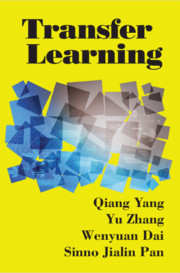Description
Transfer Learning
Authors: Yang Qiang, Zhang Yu, Dai Wenyuan, Pan Sinno Jialin
This in-depth tutorial for students, researchers, and developers covers foundations, plus applications ranging from search to multimedia.
Language: English
Subject for Transfer Learning:
Approximative price 71.34 €
In Print (Delivery period: 14 days).
Add to cart
Publication date: 02-2020
390 p. · 15.6x23.5 cm · Hardback
390 p. · 15.6x23.5 cm · Hardback
Description
/li>Contents
/li>Biography
/li>
Transfer learning deals with how systems can quickly adapt themselves to new situations, tasks and environments. It gives machine learning systems the ability to leverage auxiliary data and models to help solve target problems when there is only a small amount of data available. This makes such systems more reliable and robust, keeping the machine learning model faced with unforeseeable changes from deviating too much from expected performance. At an enterprise level, transfer learning allows knowledge to be reused so experience gained once can be repeatedly applied to the real world. For example, a pre-trained model that takes account of user privacy can be downloaded and adapted at the edge of a computer network. This self-contained, comprehensive reference text describes the standard algorithms and demonstrates how these are used in different transfer learning paradigms. It offers a solid grounding for newcomers as well as new insights for seasoned researchers and developers.
1. Introduction; 2. Instance-based transfer learning; 3. Feature-based transfer learning; 4. Model-based transfer learning; 5. Relation-based transfer learning; 6. Heterogeneous transfer learning; 7. Adversarial transfer learning; 8. Transfer learning in reinforcement learning; 9 Multi-task learning; 10. Transfer learning theory; 11. Transitive transfer learning; 12. AutoTL: learning to transfer automatically; 13. Few-shot learning; 14. Lifelong machine learning; 15. Privacy-preserving transfer learning; 16. Transfer learning in computer vision; 17. Transfer learning in natural language processing; 18. Transfer learning in dialogue systems; 19. Transfer learning in recommender systems; 20. Transfer learning in bioinformatics; 21. Transfer learning in activity recognition; 22. Transfer learning in urban computing; 23. Concluding remarks.
Qiang Yang is the Head of AI at WeBank and a Chair Professor of Computer Science and Engineering at Hong Kong University of Science and Technology. He is a fellow of the Association for Computing Machinery (ACM), Association for the Advancement of Artificial Intelligence (AAAI), Institute of Electrical and Electronics Engineers (IEEE), International Association for Pattern Recognition (IAPR) and American Association for the Advancement of Science (AAAS), and has served on the AAAI Executive Council and as President of IJCAI. Awards include the 2004/2005 ACM KDDCUP Championship, the ACM SIGKDD Distinguished Service Award, and AAAI Innovative AI Applications Award. His books include Intelligent Planning (1997), Crafting Your Research Future (2012) and Constraint-based Design Recovery for Software Engineering (1997), and he is Founding EIC of the IEEE Transactions on Intelligent Systems and Technology and on Big Data.
Yu Zhang is a research assistant professor in the Department of Computer Science and Engineering at Hong Kong University of Science and Technology, where he received his Ph.D. degree. He has published about sixty papers in top-tier AI and Machine Learning conferences and journals. He won the best paper awards at UAI 2010 and Knowledge Discovery and Data Mining (KDD) 2019, and the best student paper award in the 2013 IEEE/WIC/ACM Conference on Web Intelligence.
Wenyuan Dai is the founder and CEO of 4Paradigm Corp. He was a principal architect and senior scientist in Baidu, helping to develop one of China's largest machine learning systems, and a principal scientist in Huawei Noah's Ark Lab. He has published numerous papers at the conferences including the International Conference on Machine Learning (ICML), Neural Information Processing Systems (NIPS), Association for the Advancement of Artificial Intelligence (AAAI), Knowledge Discovery and Data Mining (KDD), and others, primarily on transfer learning and AutoML. He won the ACM-ICPC World Final 200
Yu Zhang is a research assistant professor in the Department of Computer Science and Engineering at Hong Kong University of Science and Technology, where he received his Ph.D. degree. He has published about sixty papers in top-tier AI and Machine Learning conferences and journals. He won the best paper awards at UAI 2010 and Knowledge Discovery and Data Mining (KDD) 2019, and the best student paper award in the 2013 IEEE/WIC/ACM Conference on Web Intelligence.
Wenyuan Dai is the founder and CEO of 4Paradigm Corp. He was a principal architect and senior scientist in Baidu, helping to develop one of China's largest machine learning systems, and a principal scientist in Huawei Noah's Ark Lab. He has published numerous papers at the conferences including the International Conference on Machine Learning (ICML), Neural Information Processing Systems (NIPS), Association for the Advancement of Artificial Intelligence (AAAI), Knowledge Discovery and Data Mining (KDD), and others, primarily on transfer learning and AutoML. He won the ACM-ICPC World Final 200
© 2024 LAVOISIER S.A.S.



